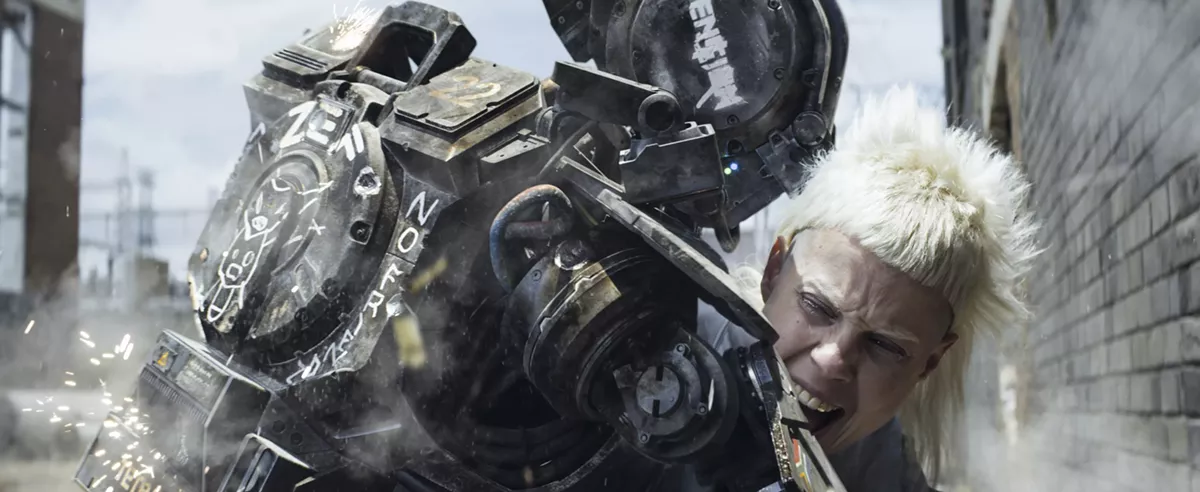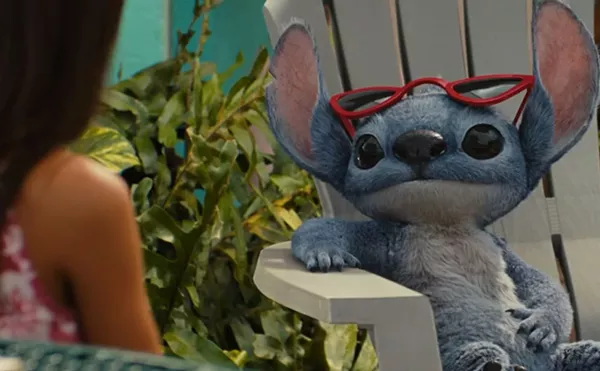

Audio By Carbonatix
[
{
"name": "GPT - Leaderboard - Inline - Content",
"component": "35519556",
"insertPoint": "5th",
"startingPoint": "3",
"requiredCountToDisplay": "3",
"maxInsertions": 100,
"adList": [
{
"adPreset": "LeaderboardInline"
}
]
}
]
Chappie / C
Writer-director Neill Blomkamp's Chappie is a passably entertaining, if crass and bombastic, sci-fi action film ... if you've never seen Robocop. Or Short Circuit. Or Terminator 2. Or Bicentennial Man. Oh, or Frankenstein.
Which is to really say Chappie kind of sucks — instead of paying homage to its myriad influences, it merely imitates them. Which is especially disappointing since Blomkamp (District 9, Elysium) has shown that he is ambitious enough to create original films (i.e., not sequels or adaptations) with allegorical scope, passionate enough to infuse them with real soul, and technically talented enough to orchestrate exciting action set pieces. Unfortunately, none of these virtues compensates for Chappie's muddled sense of morality, derivative storytelling, threadbare characters, or general all-round tastelessness.
It's South Africa a few years in the future. The Johannesburg Police Department has replaced its front-line police force with combat robots programmed to protect the townships from hyper-violent gangs. Built by a private defense contractor (headed by a wasted Sigourney Weaver), the titanium-clad droids are a huge success. Crime is down and profits are up. Unfortunately, this has left sadistic, ex-military engineer Vincent Moore (Hugh Jackman) out in the cold, unable to find adequate funding for his tank-like super weapon, Moose (a jet-packed take on Robocop's ED-209).
Equally frustrated is his idealistic colleague Deon (Dev Patel), the robo-police force's designer who has had a Red Bull-fueled breakthrough in his development of artificial intelligence — the young scientist dreams of poetry-writing droids with their own sense of social consciousness. Needless to say, the company isn't keen to let Deon test his discovery. So, he does it anyway, uploading his program into a junked robot that only has five days of battery power left. Things go awry, however, when a trio of crazed thugs kidnap him and his creation in hopes of thwarting the mechanized police from interfering with their upcoming heist.
It's here that Blomkamp makes his biggest mistake, casting Ninja and Yo-Landi Vi$$er (of the rave-rap band Die Antwoord) as eponymous criminals who abduct Deon, and then become Chappie's surrogate parents. Neither is particularly good in their role, mostly playing shrill, gun-toting, fictionalized versions of themselves. And, of course, their characters wear band merchandise and only play their own music, making their presence an elaborate form of product placement. It could be argued that Chappie is little more than a 120-minute Die Antwoord music video, had it been directed by Michael Bay.
Blomkamp's script is similarly misbegotten, with insipid dialog, scattershot plotting, and a lopsided moral code. Take for instance Deon's choice to leave his baby — Chappie is literally described as a developing child — in the arms of a pair of murderous sociopaths. Sure, the film earns a chuckle or two when Chappie is taught to strut like a gangster and greet his “maker” with “What's up, fuck mother?!” But what are we to make of his slippery moral compass? Much as young John Conner instructed the Terminator not to kill, Deon extracts a promise from Chappie that he won't commit crimes. But instead of dramatically exploiting the inherent conflict of that promise with the actions of his adopted criminal family, Blomkamp turns it into a series of obvious jokes. And even then, Chappie quickly abandons his promise when faced with his own mortality.
With a sharper, more satirical script, it might have worked. There's something interesting to be said of selfish, money and power-obsessed individuals (on both ends of the socio-economic spectrum) raising similarly awful progeny — or that a robot ends up being more human than the humans. But here, the conceit is too simplistic and haphazard, making it hard to identify with any of the characters. Everyone is a different shade of asshole, with Jackman's macho, conservative Christian villain coming off as only a few degrees more maniacal than Ninja.
Which leaves us with Chappie, whose innocence is supposed to earn our affections. Actor Sharlto Copley (through motion-capture and audio) proves to be particularly adept at depicting the robot's trusting, childlike behavior without making him insufferably cute. The special effects are impressively life-like, but it's Copley's ability to convey curiosity, fear, and even genuine warmth (without the benefit of facial expressions), that keeps the film watchable. His performance incites us to feel emotions the rest of the movie never figures out how to earn.
Chappie is rated R, has a running time of 120 minutes, and is now playing.





